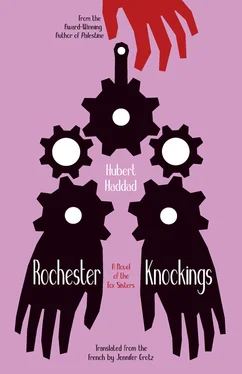But when her sister presented herself at her door, two grumbling porters beleaguered with trunks behind her, she could not conceal a startled jump at the sight of her ravaged face.
“I’ve gone to pot, no?” Margaret said gently to help out. “Soon I’ll be ready for the scrapheap! But you, you haven’t changed so much. They say that one’s face reflects one’s heart. .”
Once the luggage was deposited and the coat hung, seated face to face, the steam from a teapot undulating between them, the dialogue was renewed as if it had never stopped, and the discord between a very real aging and the transience of this decade of not seeing each other was reduced to the point of disappearing entirely: hadn’t she always carried Margaret inside her, branded like a cross of fate on her bare skin? Already, she was asking what there was to drink, some wine, some beer, some whiskey, to get her back on her feet after a crossing drowned in spray.
“By the way, where are my nephews?” she asked in surprise, somewhat confused by this lack of propriety.
“With their Uncle Herbert for the birthday of a little cousin.”
“I’m excited to meet them!” she said, helping herself to a bottle that George had been the last person to open. “And you, you’ve pulled yourself together some? Here we are, sisters in bad luck. .”
“You’re drinking too much,” Kate whispered.
“It helps me get over the old times. . Will you take me to visit the Metropolitan? I’d also love to discover the old streets, palaces, churches. Ah! what a fortune we could make here, the two of us, in the largest city in the world. .”
“I’m done with all that.”
“I understand, protect yourself, even faking with all one’s might, it still brings out dangerous forces. .”
“What!” Kate exclaimed. “You were pretending?”
“Everyone fakes it, what are you thinking, you can’t always be inspired, and then there are nights when the spirits shun you, so what do you do, in front of an audience wanting knocks, levitation, and the whole shebang, you bluff, you know it well, even a stew sometimes boils over, though sometimes it falls on a gas burner. I don’t know a single one of them, of those so-called mediums, who hasn’t been caught one time or another with pockets full of tricks. .”
Chin resting on her fists, Kate gazed at her older sister in a state of deep confusion, less because of her revelations, which entertained as much as scandalized her, than because of the mutations showing in her whole person. Her voice, her language, her face had suffered ten years of strange insults. Shivering, Kate wondered what her life must have been like since the death of Elisha Kane.
“You’re looking at me like a stranger,” declared Margaret. “I’m the same, don’t you worry. I’ve just known some distress and adversity, like a lot of women back home. And Leah didn’t help me. . Would you happen to have anything else to drink?”
They didn’t leave each other all night, remembering the fortune of the old days, the lost celebrations, and all the light ghosts of memory, handsome Lee in Rapstown, the children of Hydesville, Pequot, Lily Brown, and Harriet, the girl from the ranch where a slave was hung, and Pearl, their teacher.
“I crossed paths with her in Rochester,” said Margaret. “She became an influential woman, an activist in women’s rights. She writes novels. .”
“And her father, the reverend?”
“Dead and in hell, I hope. He deserves the hell of papists!”
The next day, when the twins were back, Margaret hugged and kissed them to the point of terrifying them, wept about all the children she wouldn’t have, while laughing the whole time at herself and singing like an old pioneer:
O boys, we’re goin’ far to-night
Yeo-ho, yeo-ho, yeo-ho!
No doubt from the logic of opposites, she turned astonishingly quiet in the weeks that followed, absent by day and plunged at night into the study of religious works. Since she had stopped drinking and becoming angry at every mention of Leah, supreme usurper of the kingdom of ghosts, Kate thought that the distance had calmed her back down. Maggie was resting in London from the extravagance of energies, spiritual insurrections, and conflicts of all kinds that were overflowing from the American cauldron.
Distraught, with no other desire than some support from beyond, she actually ran to churches and temples. Despite her dyed hair and the powder on her face, age had adulterated the comforting reflection that glances in the mirror used to return. Emptied of any sentiment de soi —that hot evanescent roundness that is perpetuated in a waking dream, a sort of inner sanctuary where one waits endlessly for who knows what — she wandered under a changing mask, by turns tragic or as indifferent as the London sky, from a nestled chapel in a dungeon at the church of St. Marylebone so similar to the churches in New York, to the St. Paul Cathedral, then to St. Clement Danes next to Covent Garden. This deserted splendor, under the shadow arches, between two directions of crowds during the divine offices, soothed her without having to determine the nature of the sect at work, be it Anglican, Methodist, or Presbyterian. The misery that circled the city, beyond the buildings and kept parks — in Whitechapel, in the East End, the area surrounding St. George, where weary prostitutes paraded among packs of grimy children, drunkards, and crippled seekers, in Limehouse or Lisson Grove, with its wide streams of human distress between the railways and channel gaps — seemed to her like an unknown, more ancestral species across the Atlantic, flourishing on its own cankers or as if moored to its own shipwreck.
From wandering to wandering, it was in the heart of London, at the end of Whitehall, in the City of Westminster, that she found her haven. The splendors of the abbey astonished her without emotion. Neither the tombs of a king and his queen behind the altar, nor the heraldic banners of the Knights over the stalls caught more than a moment of her attention. But she came to a stop before a statue of the Virgin, under a big dome fanned with sculpted shields, in the center of the stone circle of apostles and saints.
For several days she returned to Lady Chapel, weary perhaps from a vain wonder, trudging to the old prison yards where the cathedral must have been built, next to the preserved oratory of the former Catholic church adjoining a building probably used as a presbytery. Margaret entered the sanctuary feeling a mixture of oppression and deliverance. The burning bush of candles and the blue smoke from the censers at the foot of an effigy of the Immaculate Conception along with the shadow cast by a large crucifix of the dead Christ, sides pierced, conjured for her in some ways the arrangement of a medium’s cabinet. She remained so long in front of the Virgin, haggard, with an imploring look, that a priest sitting in prayer in the shadows of a recess began to worry about her. The apparition came over and leaned down to her, thin in her black dress with red piping and buttons.
“You need help, we have all been in sorrow; are you Catholic?”
Those words of this clergyman, encountered by chance in the remains of a church, shattered Margaret who, after a long interview and a complete confession, feverishly accepted conversion. The influence of the priest over her was immediate and without reservation. She learned later, at the moment of the sacraments of baptism along with the company of other converts, that he was the Archbishop of Westminster, the Cardinal Henry Manning, one of the most influential Catholic theologians, fully committed to John Wesley’s idea of social justice. Manning himself had converted after a heretic past and, on one finger along with the episcopal ring, wore the ring of his young wife who had died shortly after their marriage. A secret necromancer in his own dreams, the inconsolable prelate perceptively understood the emotional challenges of the new doctrine. Margaret was for him an easy prey as well as a trophy: already won by the Virgin Mary, she was persuaded as by her husband before her of the highly terrifying register of damnation. Didn’t everything in spiritualism fall into demonic practices? Captivated by the spells of the Catholic liturgy, but duly unbewitched, she felt better in the months that followed, in a convalescence with no pharmacopoeia other than holy water and the bread of angels.
Читать дальше












